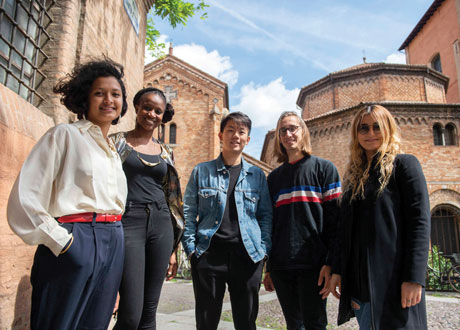2020 Applying to Graduate School in International Affairs
THIS GUIDE IS NO LONGER ACTIVE. For the current FP Guide, click here.
Johns Hopkins University School of Advanced International Studies
In a Time of Turmoil, Flexibility is Crucial
 Johns Hopkins University’s School of Advanced International Studies (SAIS) is putting a premium on flexibility, in a world upturned by a pandemic layered atop widespread economic and social upheaval. As the school adjusts its programming, financial aid, and networking and advising opportunities to the new reality, it is encouraging prospective students to demonstrate their own resourcefulness.
Johns Hopkins University’s School of Advanced International Studies (SAIS) is putting a premium on flexibility, in a world upturned by a pandemic layered atop widespread economic and social upheaval. As the school adjusts its programming, financial aid, and networking and advising opportunities to the new reality, it is encouraging prospective students to demonstrate their own resourcefulness.
“Be creative and show your individuality,” says Sidney T. Jackson, assistant dean for global enrollment and recruitment at Johns Hopkins SAIS, noting that evaluators scrutinize application essays for characteristics such as authenticity. “An application that will stand out from others is genuine and comes from a place of honesty.”
In addition to a strong academic record and a passion for a career in international relations, successful applicants show quantitative aptitude, some professional experience related to their area of interest, and international experience through work, volunteering, or study abroad.

“Now more than ever before, our focus is to connect individually with prospective candidates. Whether by phone, e-mail, or through virtual events, our team is here to help you discover which program will best support your academic and professional goals.” –Sidney T. Jackson, Assistant Dean of Global Enrollment and Recruitment, School of Advanced International Studies, Johns Hopkins University
Johns Hopkins SAIS—which has campuses in Washington, DC, Europe, and China—encourages candidates to research their options for academic programs as well as for financial aid. The school has increased its online admissions programming, such as student-led information sessions and mini-lectures hosted by faculty throughout the semester. The aim is to help admissions candidates connect with its tight-knit, collaborative community.
The cost barriers, especially in these tight economic times, often can be overcome with the array of scholarships available to eligible students, regardless of citizenship. College websites and financial aid webinars can help prospective students determine the actual cost of attendance and, importantly, the return on investment, Jackson says.
Master of Arts in International Relations
The school’s flagship Master of Arts in International Relations, along with the Master of International Public Policy for experienced professionals, will offer more flexibility for students to focus on their priority issues. Starting in fall 2021, the International Relations master’s program will make many former requirements optional and emphasize learning in the areas of leadership, decision-making, data analytics, economics, geopolitics, and research methods. The core curriculum will be function-based—for example, international economics and finance, or development, climate, and sustainability. The curriculum also offers students the ability to focus on a geographic area, such as Asia, or China specifically.
)))All that is rounded out by practicum projects, study trips, internships, practical research papers, language training, and opportunities for dual degrees and exchange programs.
 Graduate Degree Program Options
Graduate Degree Program Options
• MA in International Relations
• MA in International Economics and Finance*
• MA in Global Policy (for experienced professionals)*
• MA in International Affairs**
• MA in European Public Policy**
• MA in Global Risk**
• MA in International Studies***
• MA in Global Risk (online)
• MA in Sustainable Energy (online)
• Master of International Public Policy (for experienced professionals)
The school also offers individual courses, graduate certificates, and doctoral programs.
*Based in Washington, DC
**Based at SAIS Europe in Bologna, Italy
***Based at the Hopkins-Nanjing Center in Nanjing, China
Deadlines for Fall 2021
Application and Financial Aid/Scholarships: Early notification, November 1, 2020; regular, January 7, 2021
Standardized Exam Scores: The GRE or GMAT are optional for most degree programs. The TOEFL/IELTS may be required for non-native English speakers, if applicable.
Recommendation Letters: Two are required, with the option of a third.
Application Checklist: https://sais.jhu.edu/apply-today
Contents
- 2020 Applying to Graduate School in International Affairs
- UC San Diego, School of Global Policy and Strategy
- Johns Hopkins University School of Advanced International Studies
- Virginia Tech, School of Public and International Affairs
- Seton Hall University, School of Diplomacy and International Relations
- University of Denver, Josef Korbel School of International Studies
- University of Notre Dame, Keough School of Global Affairs
- University of Kent, Brussels School of International Studies
- American University, School of International Service
- George Mason University, Schar School of Policy and Government
- Syracuse University, Maxwell School of Citizenship and Public Affairs
- Arizona State University, Thunderbird School of Global Management
- Princeton University, Princeton School of Public and International Affairs
- Indiana University, Hamilton Lugar School of Global and International Studies
- Yale University, Jackson Institute for Global Affairs

